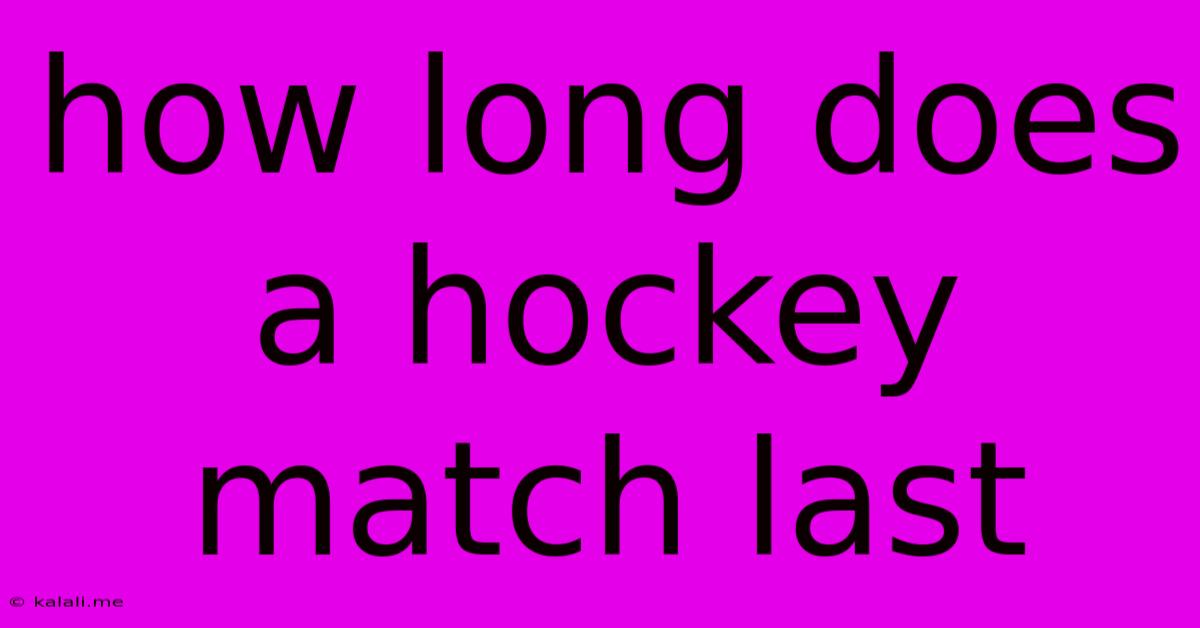How Long Does A Hockey Match Last
Kalali
Jun 11, 2025 · 3 min read

Table of Contents
How Long Does a Hockey Match Last? A Comprehensive Guide
So, you're curious about the duration of a hockey game? It's not as straightforward as you might think! The length of a hockey match depends on several factors, including the level of play (professional, amateur, youth) and the specific rules in place. This comprehensive guide will break down the different scenarios and answer all your questions about hockey game time.
Understanding the Different Levels of Play
The length of a hockey game varies considerably depending on the level of competition. Let's explore the most common scenarios:
National Hockey League (NHL) Games:
A standard NHL regular season game consists of three 20-minute periods. However, this doesn't mean the game lasts only an hour. There are stoppages in play for various reasons, including:
- Face-offs: These occur after goals, icing violations, and other stoppages of play, adding significant time.
- Penalties: When a player commits a penalty, the offending team plays short-handed, and the clock continues to run only during actual gameplay.
- Injuries: Medical timeouts to attend to injured players add to the overall game time.
- Television Timeouts: Commercial breaks are frequent during professional games, further extending the actual time.
Therefore, while the official playing time is 60 minutes, an NHL game typically lasts between 2 hours and 30 minutes to 3 hours. Playoff games can run even longer due to higher intensity and the potential for overtime periods.
International Hockey Games:
International hockey games, such as those played in the Olympics or World Championships, usually follow a similar format to NHL games, with three 20-minute periods. However, the length and frequency of stoppages might vary slightly based on the officiating and specific rules. Expect a similar overall game duration to NHL games.
Minor League and Amateur Hockey:
The duration of minor league and amateur hockey games can vary. While many follow the three 20-minute period format, some leagues might use different period lengths (e.g., 15-minute periods) or a different number of periods. Always check the specific league rules for precise details. Expect shorter game times compared to professional games due to fewer stoppages and a potentially faster pace of play.
Youth Hockey:
Youth hockey games often have shorter periods to accommodate younger players' stamina and attention spans. Period lengths can range from 10 to 15 minutes, typically with three periods. The overall game duration will be significantly shorter than professional games.
Overtime and Shootouts:
In many leagues, if the score is tied at the end of regulation time, an overtime period is played. Overtime rules vary widely:
- Sudden-death overtime: The first team to score wins.
- Multiple overtime periods: Overtime continues until a team scores.
- Shootouts: If the game remains tied after overtime, a shootout is often employed to determine the winner. These shootouts add additional time to the game.
In Conclusion:
The answer to "How long does a hockey match last?" isn't a simple one. While the official playing time can be determined by the number and length of periods, the actual duration varies significantly depending on the level of play, the intensity of the game, and the number of stoppages. Expect professional games to last significantly longer than amateur or youth games, often exceeding the official 60-minute mark due to stoppages in play, commercial breaks, and potential overtime periods. Always check the specific league rules for the most accurate information.
Latest Posts
Latest Posts
-
E N I A C Stands For
Jun 12, 2025
-
What Was The First Word Processing Program Used In 1979
Jun 12, 2025
-
The Ends Of A Long Bone Are Called The
Jun 12, 2025
-
Which Planet Has The Fastest Revolution
Jun 12, 2025
-
Least Common Multiple Of 4 6 And 10
Jun 12, 2025
Related Post
Thank you for visiting our website which covers about How Long Does A Hockey Match Last . We hope the information provided has been useful to you. Feel free to contact us if you have any questions or need further assistance. See you next time and don't miss to bookmark.